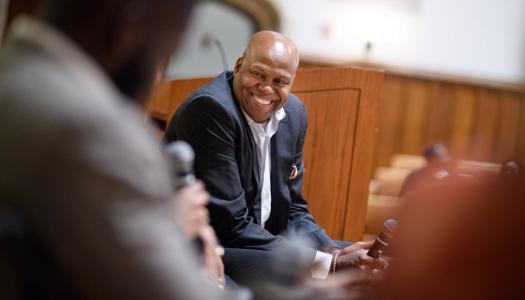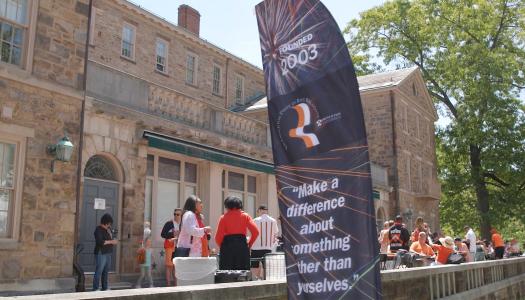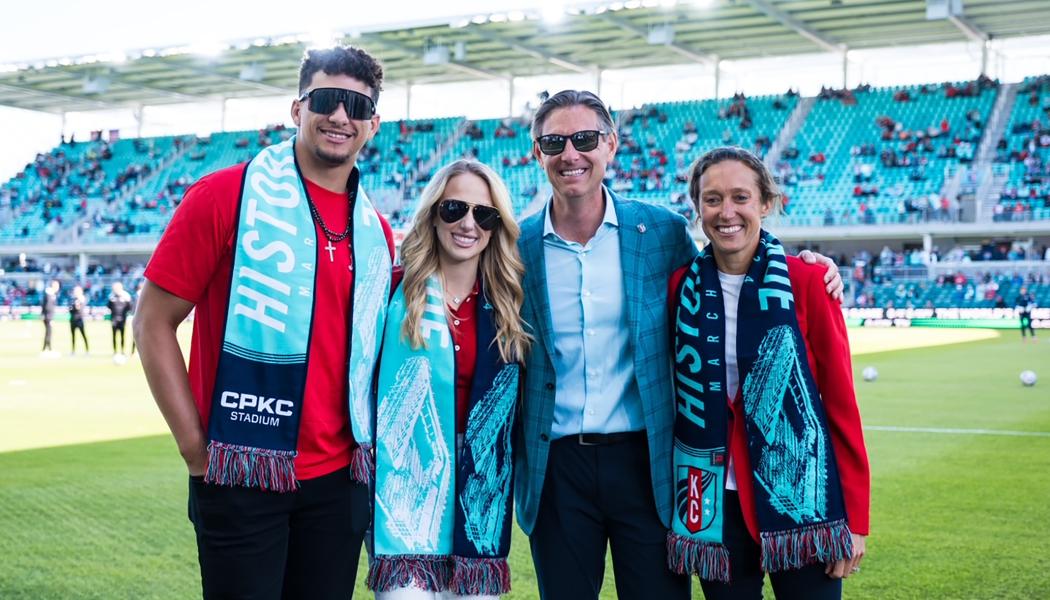
From right, Kansas City Current owners Angie Long ’97, Chris Long ’97, Brittany Mahomes and Patrick Mahomes.
Game Changers: Angie Long ’97 and Chris Long ’97 are taking women’s sports to another level
Professional women’s soccer made its debut in Kansas City, Missouri, on April 13, 2013, as FC Kansas City, one of eight teams in the fledgling National Women’s Soccer League (NWSL), kicked off its season in a suburban stadium owned by the local school district and shared between three area high schools. Sadly, the arrangement wasn’t unusual, since even the most successful NWSL teams have always shared their facilities with other teams. While FC Kansas City went on to win two NWSL championships, they never quite found a place to call home, playing their games in two other local stadiums before shutting down operations in 2017. Only 1,312 fans showed up to their final home game held at the training facilities used by Kansas City’s men’s soccer team.
Fast-forward to March 16, 2024, when Angie ’97 and Chris Long ’97 joined 11,500 raucous fans who packed into CPKC Stadium to witness history as the Kansas City Current opened their NWSL season in the first-ever stadium built solely for a professional women’s sports team. Sitting on the banks of the Missouri River, just north of Kansas City’s growing downtown, the stadium raises the bar for women’s sports at a time when most teams are still second- or third-priority tenants in stadiums built for men’s teams. “This was long overdue,” said Angie who, along with Chris, is responsible for getting the stadium financed and built for their NWSL team. “We’re excited to set a new standard for how female players should be treated.”
Now, as they sit at the season’s midpoint, the couple and the Current’s co-owners, Brittany and Patrick Mahomes, are reaping the benefits from their bold $140 million bet on women’s sports: the Current are battling the Orlando Pride for first place at the top of the NWSL standings and every home game at CPKC Stadium is sold out through the NWSL Championship on Nov. 23. “Every seat is located within 100 feet of the pitch,” Chris said. “In designing the stadium, we thought about our Princeton heritage and it’s amazing architecture and how we could create something others could emulate.”

Though a professional women’s sports stadium is long overdue, the Longs couldn’t have timed the launch any better with interest in women’s sports skyrocketing. Last summer saw a record 92,000 people jam into he University of Nebraska’s football stadium to watch a women’s volleyball match and nearly 2 million fans crowded Australian and New Zealand stadiums to attend the 2023 FIFA Women’s World Cup. In April, 18.7 million TV viewers watched Caitlin Clark and the Iowa Hawkeyes take on the South Carolina Gamecocks in the NCAA Women’s Basketball National Championship — almost 4 million more than watched the men’s championship game the following day.
“Women’s soccer is on a tremendous trajectory,” Chris said. Overall attendance at NWSL games topped 1 million for the first time in 2022 — 70% growth from the previous year — and the league has already surpassed that mark halfway through the 2024 season. “With the Olympics and the World Cup on the horizon, there’s so much going on with broadcast TV and streaming media,” he said. “The league has some of the best players in the world [including 56 Olympians who played in Paris] and we’re taking advantage of this tailwind.”
This NWSL season is the first since the league agreed to a four-year $240 million media-rights deal with CBS, ESPN, Prime Video and Scripps Sports — a 40-times increase over its previous deal. “It’s about time,” Angie said. “Women’s sports have long suffered from a lack of investment. We have the product and we’re determined to give it proper funding.”
Two for the Money
Having dedicated their entire careers to portfolio management and trading, the Longs know the investment world inside out. Their history in finance and investment dates back to their time at Princeton, where the couple met while working on problem sets in a corporate finance class. “We went on our first date in 1996 at Winberie’s on Palmer Square,” Angie said. They married two years after graduation.
Chris had come to Princeton from Hazleton, Pennsylvania, after being recruited to play basketball. As a shooting guard, he played for Coach Pete Carril’s team for two seasons. “From Coach Carril, I learned about patience, precision and teamwork, all of which I rely on every single day,” he said.
Two of Angie’s uncles were Princeton alums, so she always knew she wanted to be a Tiger. Growing up in Kansas City, she was a year-round athlete and lettered as a soccer goalkeeper in high school. “I have two younger brothers and we were always outside playing something — football, basketball and lots of soccer.”
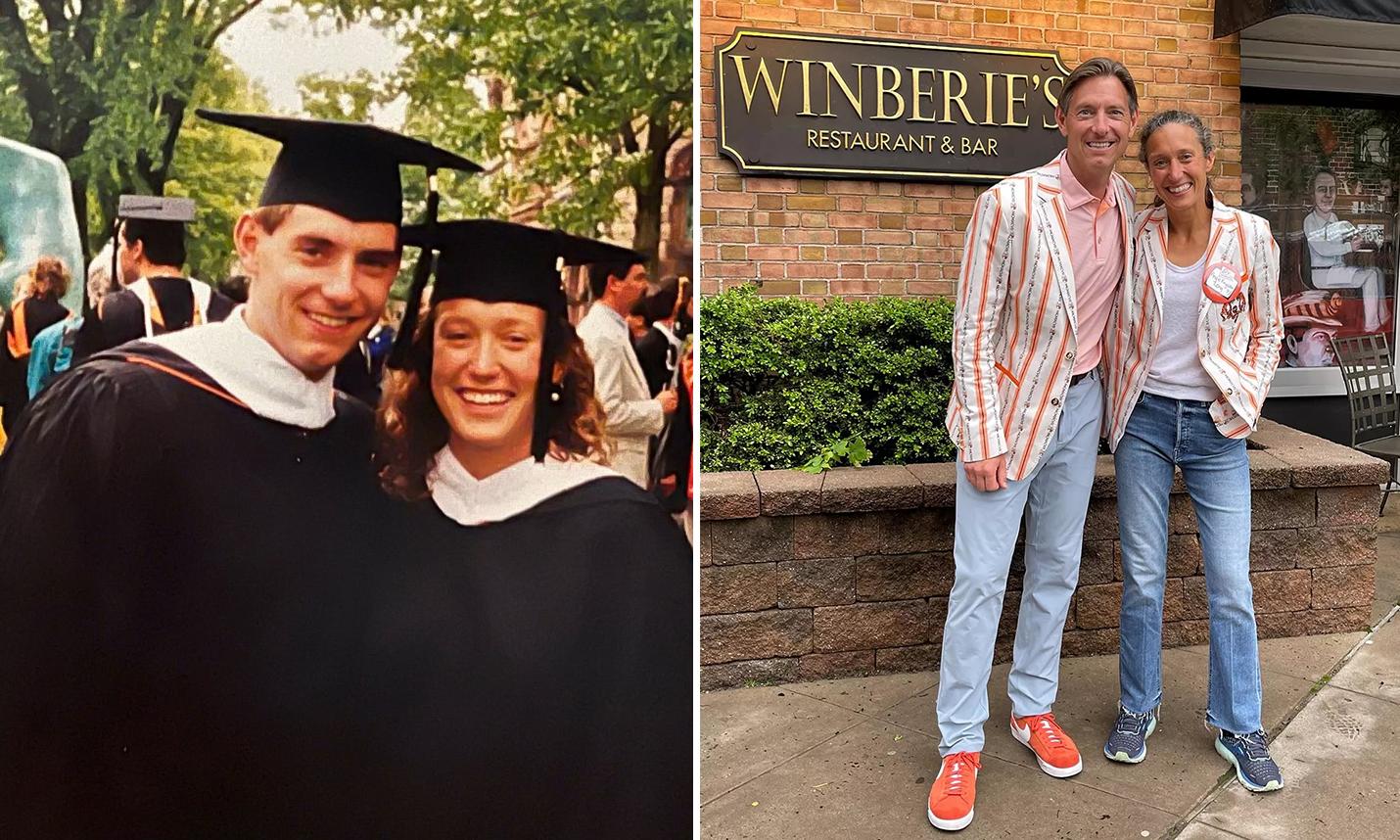
At Princeton, Angie played golf before becoming an All-American and two-time national champion on the women’s rugby team, where she played alongside Kimberly Johnson ’95, University trustee and co-owner of the NWSL’s Washington Spirit.
After graduating, the Longs worked on Wall Street for financial firms like J.P. Morgan and TH Lee Putnam Ventures, before Chris went to Harvard to get his master’s in business. In her 13 years at J.P. Morgan, Angie became a pioneer in the world of credit-related asset management and was named a managing director by the time she was 29. “The intensity of being a Princeton student-athlete helped me when it came time to run a trading desk on Wall Street,” Angie said.
Now Chris is the CEO and Angie is the chief investment officer of Palmer Square Capital Management, a firm that oversees about $31 billion in assets and invests in debt securities, loans and bonds. They started the company in 2009 and named it after the location of their first date. The secret to their success? “We’ve always played off each other well and have complementary qualities and skills,” Chris said. “It also helps to work in separate areas of the business.”
The Longs were inspired to invest in an NWSL team after seeing the power of women’s soccer through their youngest daughter’s eyes. “It all stems back to the 2019 Women’s World Cup in Paris, France, during which there were a series of international youth matches in the area that we took our daughter, Mary, to play in,” Chris said. “And every night, we would take in a different World Cup game.”
Seeing the global power of women’s soccer made it clear that they needed to bring a team back to Kansas City. “We started analyzing, from a financial perspective, what it meant to own a team,” he said. “And we realized to be truly successful, we needed to own and control our facilities.”
A Rising Current
Before buying the team that would become the KC Current in 2020, the Longs consulted with Grant Wahl ’96 (legendary journalist and soccer expert) and Kara Nortman ’97, a friend who co-founded Angel City FC, the first majority-female-owned professional U.S. sports franchise. While there are plenty of women investors in the NWSL, Angie said, “the percentage of women owners is still too low. I don’t understand why there weren’t more to begin with.”
They also learned that facilities are among the biggest challenges — even for the most successful teams. So in 2021, they invested $25 million in a 17,000-square-foot training facility and bought 75 acres right off the Missouri River for the Current that includes two grass pitches, five turf pitches, locker rooms and dedicated spaces for wellness, nutrition, player development, recovery and weight training. “We wanted to build a training center that met every single one of the players’ needs,” Chris said. “How can you be the best at whatever you’re doing if you don’t have proper facilities?”
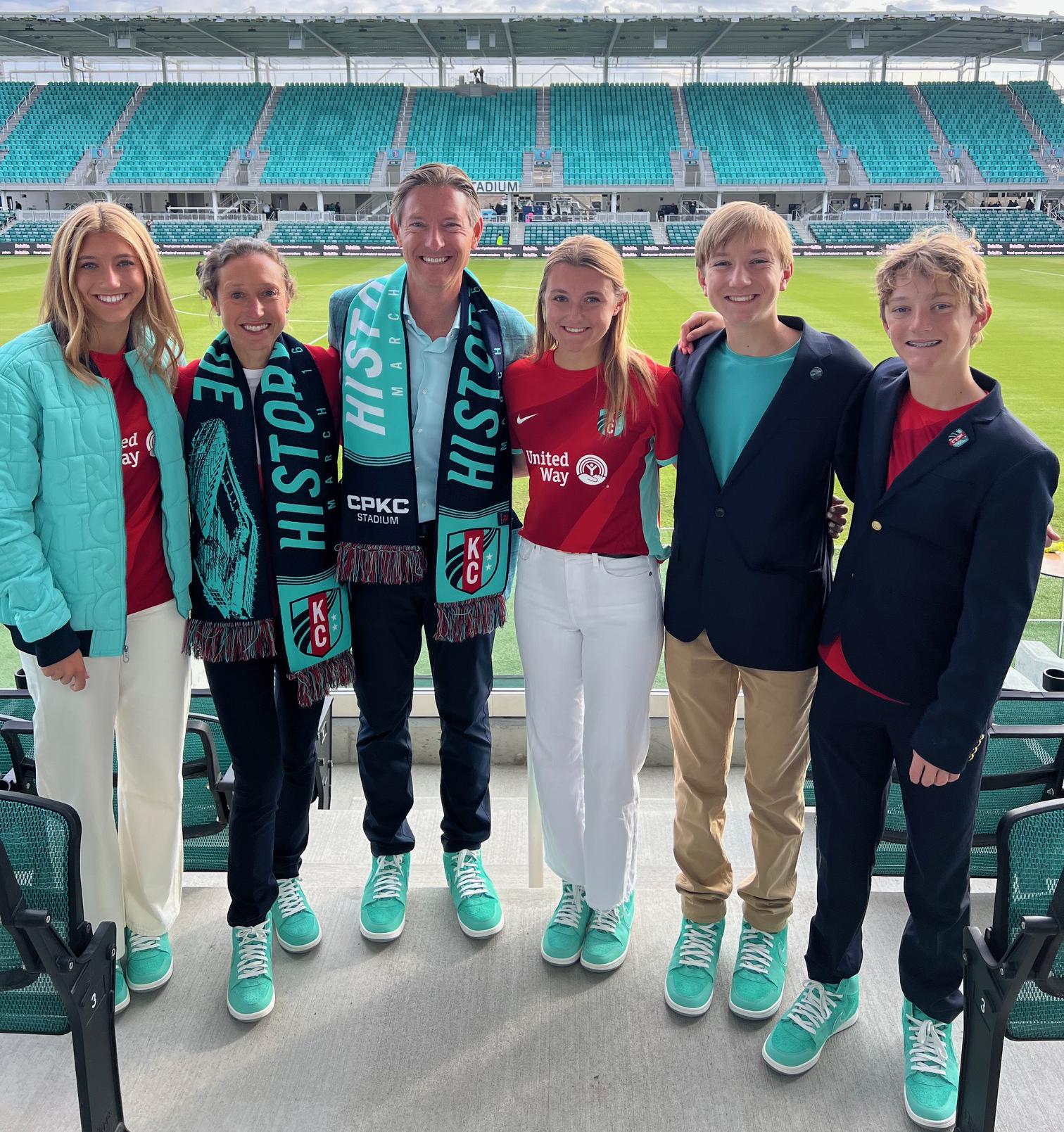
While doing their due diligence and running the financial models, he says they saw the potential for five times return on their investment with their own stadium. “Besides allowing greater control of revenue and expenses, owning the stadium gave the team the ability to pursue sponsorships, other events and choose prime dates and times for home games,” Chris said.
Unfortunately, there wasn’t a model for the Longs to follow when it came to financing a stadium for women’s sports facilities, just men’s. “There was no precedent for women’s sports that we could point to when talking to banks,” Angie said. “So, we got a hard no from most of them.” All but J.P. Morgan, where they both once worked and which had recently invested in the growth of soccer in the U.S. by financing soccer-only stadiums in Orlando, Florida, and Austin, Texas.
Yet for all the naysayers pointing to previous professional women’s teams and leagues that crashed and burned, the Longs have succeeded in offering a radical new model for success. CPKC Stadium is now the centerpiece of a revitalization project for the Kansas City riverfront that is already spurring new development, with the prospect of condos, boutique hotels, restaurants and an extension of the Kansas City Streetcar being built there. “We’re leading the riverfront development and are looking to integrate the river in a way that’s much more accessible and a part of everything,” Chris said.
Later this year, an $800 million mixed-use development project will break ground on land adjacent to the stadium that will include public spaces for food festivals and live music, a promenade and about 2 million square feet of retail, office and residential space.
For their part, the Longs are already planning to expand the stadium by thousands of seats in a few years. “We believe the upside for women’s soccer in the United States is enormous,” Chris said. “As a product, women’s soccer is one of the best out there, but for a long time, it was hard to figure out where the games were being televised. Now we have investment and the vehicles to tell the stories.”
After the CPKC Stadium’s inaugural game on March 16, in which the Current outscored the Portland Thorns, 5-4, NWSL commissioner Jessica Berman said Chris and Angie Long’s legacy will be that they won’t be the last to build a women’s sports stadium. Angie described feeling pure joy that day as she watched the players and fans revel in their new permanent home. “It’s been the ride of lifetime,” she said. “We’ve set the bar on what you can do with women’s sports and that’s going to have ripple effects for a long time.”
